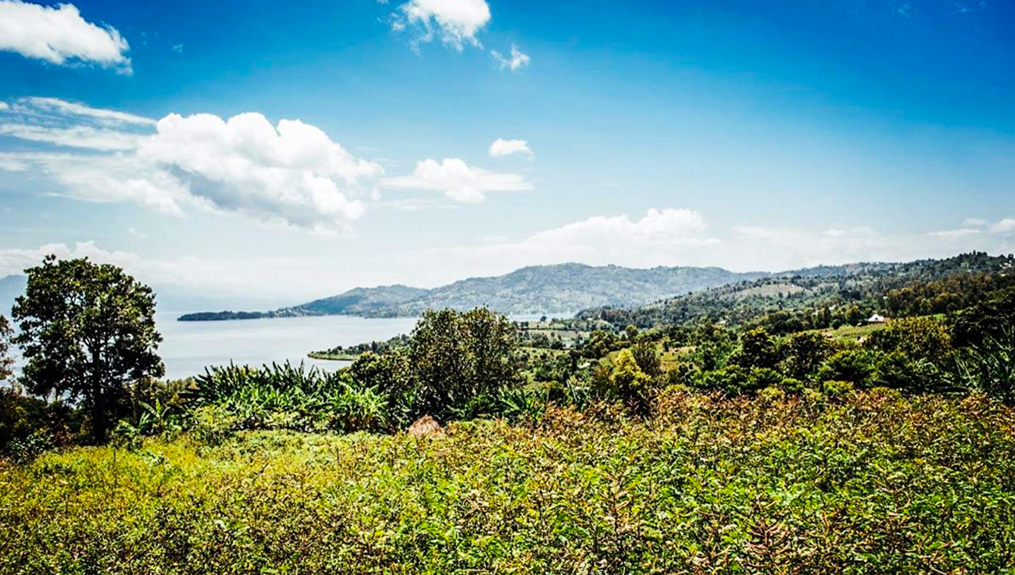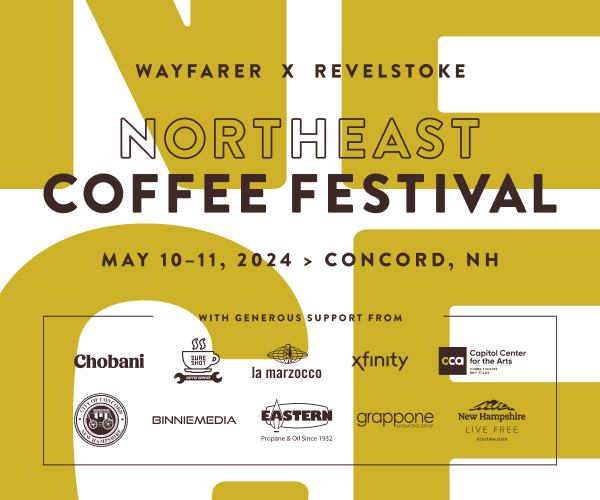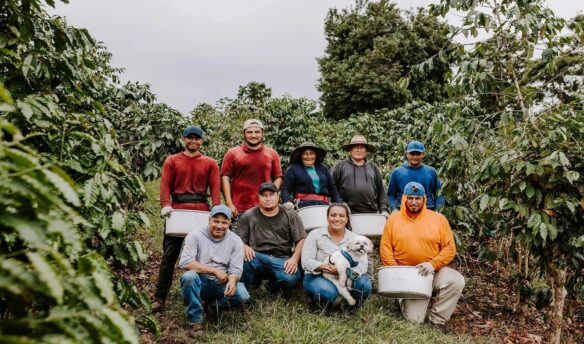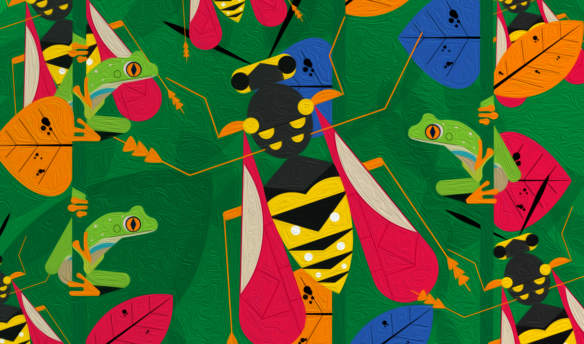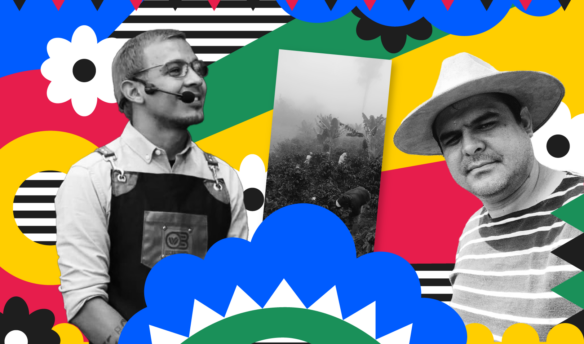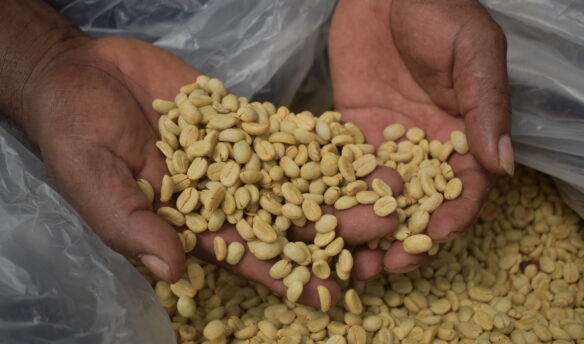Idjwi Island on Lake Kivu, DRC. Photo: @mightypeacegram
I thought Congolese coffee was a myth.
I heard these words during a workshop organized by one of New York City’s major roasters; the instructor said this after telling her that I was importing delicious coffees from the Democratic Republic of Congo (also referred to as DRC or Congo).
The instructor thought Congolese coffee was a myth because she would hear people rave about it, she heard whispers about its uniqueness, but she never saw it anywhere. Due to its absence from the market and the fact that she had never tasted Congolese coffee despite studying the industry and having worked in coffee for years, it had taken on a mythical status in her mind. As a newcomer to the sector (Mighty Peace Coffee turned 2 in September), I was shocked to hear her say that.
In her defense, Congolese coffee has historically been absent from most coffee roasters’ menus and importers’ offering sheets. Those who know it love it and want more, but they’re often frustrated by its lack of consistent availability and the logistical difficulties of operating in DRC. Additionally, I’ve heard painful stories from importers and roasters about past experiences regarding significant delays.
Nevertheless, they broadly agree that once the logistics can be figured out, as we have at Mighty Peace Coffee, Congolese coffee will become a go-to in America because of its unique versatility as a single-origin coffee and versatility as a blend component.
Fact Vs. Fiction
The mythical status of Congolese coffee (and the Democratic of Congo in general) is correlated with the fact that the DRC’s people and landscape have fascinated storytellers and mythmakers in literature and Hollywood for centuries. One of the most notable examples is Joseph Conrad’s Heart of Darkness, published in 1899. The book was inspired by the horrors Conrad saw throughout his travels in what was then called Congo Free State during Belgium’s King Leopold II’s rule.
According to literary critic Harold Bloom, Heart of Darkness has been analyzed more than any other work of literature in universities and colleges. In Hollywood, Congo, a blockbuster about killer gorillas starring Laura Linney, was released in 1995 and grossed more than $150 million at the box office.
King Leopold II, whose regime had a policy of cutting off the hands of Congolese who didn’t meet rubber production quotas, will soon be the subject of a Ben Affleck-produced film called King Leopold’s Ghost. Virunga, one of DRC’s most well-known national parks and the home of endangered mountain gorillas, was the subject of a documentary released by Netflix in 2014—Leonardo DiCaprio and Barry Jenkins have signed up to produce a movie adaptation of this documentary.
Oscar-winner Ryan Gosling traveled to Congo and served as the photographer for Congo Stories, a book published in 2018 which tells stories of Congolese activists and leaders. Golden Globe winner Robin Wright narrated When Elephants Fight, an award-winning documentary produced by Mighty Peace Coffee Chairman JD Stier about the role of tech companies on supply chain transparency in the mining sector. The Congo River, Africa’s second-largest river after the Nile, and its rainforest, the second-largest in the world after the Amazon, have long fascinated explorers and storytellers who have all contributed to the Congolese myth.
As a result, fact and fiction often collide when it comes to Congo.
In the Global Coffee Landscape
As we distinguish between facts and fiction about Congo and its coffee, let’s first understand where the DRC currently stands in the global coffee landscape.
It is estimated that more than 70% of the coffee grown in the DRC gets smuggled into neighboring countries, most notably Rwanda and Uganda, where Congolese farmers can earn 15% more money than if they were to sell it locally.
This issue only partially explains why Congo’s contribution to global coffee exports stands at a paltry 0.14%. High operating costs are a big part of the problem; they can be between 66% and 133% higher in DRC than in neighboring Uganda. In an industry where stakeholders across the value chain worry about low margins, these high costs explain why many are staying away from Congo.
While some avoid the DRC altogether, others have been investing in Congolese coffee and its infrastructure. The Eastern Congo Initiative, the Howard Buffett Foundation, USAID, UKAID, ELANRDC, Starbucks, and more have financed research, built washing stations, and provided training programs to cooperatives and farmers. Higher Grounds in Michigan and Counter Culture in North Carolina were among the early adopters in the United States. Saveur du Kivu, the country’s premier coffee festival, has been financed by Higher Grounds. The festival is a fantastic opportunity for farmers and cooperatives to share their latest crops with international coffee buyers.
Congolese coffee is highly versatile; its flavors vary from fruity, with red plum, cantaloupe, stone fruit, plum, cherry, and licorice note; to creamy notes of white chocolate, vanilla and hazelnut. It stands on its own as a single origin or a great complement to blends. The volcanoes, elevation, Lake Kivu, and the rich and fertile soil create ideal conditions for unique beans.
Some of the roasters I’ve introduced to Congolese coffee sometimes compare it to great Guatemalan and Ethiopian coffees. These comparisons are more a testament to the human tendency to compare the new to what we’re familiar with. We do that in sports: for example, people often compare LeBron James to Michael Jordan, but as familiarity increases with Congolese coffee, we expect these comparisons to cease and for people to view Congolese coffee on its own and not in relation to other great coffees.
Vision for Growth
Congolese coffee won’t be a myth to many for much longer, and it’s starting to appear on more offering sheets. Speaking with fellow importers across the country, they’re looking to import more of it in 2021, with quite a few asking for insights on Mighty Peace Coffee’s supply chain, given our local presence in the country. Additionally, there has recently been a series of announcements about investments and initiatives in Congo from Nespresso and other importers.
As a Congolese immigrant who now calls New York home, I dream of my country’s coffee not being an afterthought or an exotic option that roasters try once every few years but rather a mainstay for coffee brands across the country.
I’m working towards making this dream a reality because I know coffee can be a catalyst for inclusive economic transformation. A cash crop like coffee cannot be the only vehicle for development, but it can play an essential role. Investment in the DRC’s coffee will spark an increase in skilled jobs, industrialization, and private sector-led economic growth that will expand the country’s narrative. It’s why I came into the industry, and it’s why we launched a social impact importing startup two years ago.
This vision for inclusive economic growth will come to fruition through the mythical Congolese coffee bean.
This article was originally published on October 5, 2020, and has been updated according to Fresh Cup’s current editorial standards.

